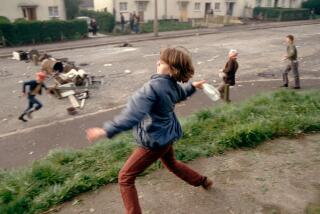DIPLOMACY : Face to Face With ‘Troubles’ of N. Ireland, Clinton Blinks
- Share via
LONDON — Will he or won’t he?
British political leaders expressed some relief this week when President Clinton postponed his decision on whether to send a special U.S. envoy to investigate allegations of human rights violations in Northern Ireland.
After his White House meeting with Irish Prime Minister Albert Reynolds on St. Patrick’s Day, Clinton put the selection of such a special emissary on hold.
Further, he did not detail whether his representative would be a “peace” envoy--a description that had upset the British--or a “fact-finder,” a term that would be acceptable to British Prime Minister John Major.
“We don’t think the idea of a peace envoy is a particularly good idea,” said a Major aide, discussing the U.S. proposal to try to prod a peaceful resolution to the sectarian conflict that has riven Northern Ireland. “But a fact-finding mission would be OK.”
Clinton declared it would be “inappropriate” to decide on a special envoy now. But he did announce the appointment of Jean Kennedy Smith, sister of the late President John F. Kennedy, as the U.S. ambassador to Ireland.
BACKGROUND: The British--taking note of 400 years of history--see as intractable the conflict between Catholic Republicans, who want the six counties of Northern Ireland united with the 26 counties of the Irish Republic, and Protestant Unionists, who want to remain tied to Britain.
When sectarian violence broke out, Britain sent in troops in 1969 whose mission was originally to protect the minority Catholic population. But the soldiers soon earned the Catholics’ rancor for their often-roughshod ways.
Over the years, various peace talks have been proposed between the Irish and British governments, as well as among local leaders in Northern Ireland. The latest round began in March, 1991, and ended last November, with all sides saying further discussions should be conducted.
OPPOSING FORCES: Britain has 19,000 military personnel on duty in Northern Ireland, including 5,700 members of the locally recruited Royal Irish Regiment.
The Irish Republican Army operates under heavy secrecy but is believed to have no more than 500 full-time, arms-bearing members whose tactics are directed against British soldiers in Northern Ireland and civilian targets of bombings in England.
The IRA says its members are freedom fighters; the British call them terrorists.
While the IRA is outlawed, its political arm, Sinn Fein, runs candidates for office under the leadership of the charismatic Gerry Adams. But the Catholics are outvoted by the majority Protestants, under such fiery Unionist leaders as the Rev. Ian Paisley.
OUTLOOK: The British are aware that more than 40 million Americans claim to be part Irish, a constituency that Clinton and other U.S. politicians can’t ignore.
But they believe that sincere U.S. fact-finders in Northern Ireland would agree with Northern Ireland Secretary Sir Patrick Mayhew’s views expressed this week that “human rights are, indeed, abused in Northern Ireland--abused on purpose and with authority by terrorists pursuing their evil and fruitless campaigns at the behest of their leaders.”
The chief hope for an eventual peace rests with the all-parties talks, adjourned because of national elections in the Irish Republic; the talks must now await local elections in May, after which they are expected to resume.
More to Read
Sign up for Essential California
The most important California stories and recommendations in your inbox every morning.
You may occasionally receive promotional content from the Los Angeles Times.













